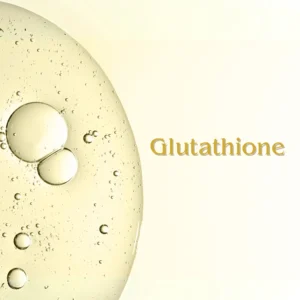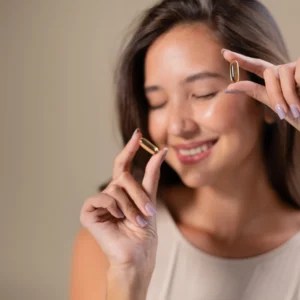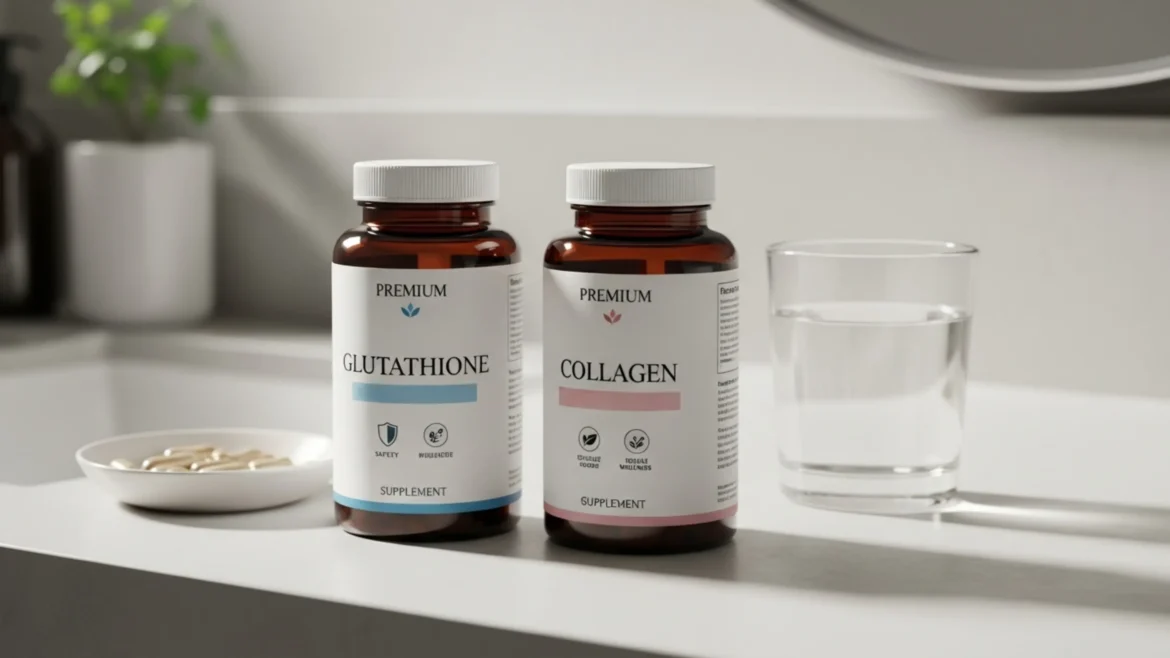Glutathione has become one of the most talked-about supplements in the world of skincare and wellness—and for good reason. Often called the “master antioxidant,” it’s known for its role in detoxification, immune support, and most famously, skin brightening.
But did you know that glutathione works even better when paired with Vitamin C? Vitamin C isn’t just a helpful vitamin to have on hand. It’s essential in helping glutathione do its job effectively. When taken together, these two nutrients can boost your health, support glowing skin, and strengthen your body’s natural defenses.
In this article, we’ll explore how glutathione and Vitamin C work, why they’re better together, and how much of each you actually need.
Highlights
- Glutathione works best when paired with Vitamin C, which helps stabilize and recycle it for better results in skin and overall health.
- Taking the right dosage matters — 500–1000 mg of Vitamin C and 250–1000 mg of glutathione daily is common, but balance is key.
- Consistency, hydration, and lifestyle (like avoiding alcohol and eating antioxidant-rich foods) greatly improve glutathione’s effectiveness.
Table of Contents
What Exactly is Glutathione?

Photo from Canva Stock Images
Glutathione is a powerful antioxidant naturally produced by the body. It helps protect your cells from damage caused by free radicals, toxins, and pollution. Aside from its detoxifying abilities, glutathione also plays a key role in:
- Supporting the immune system,
- Reducing inflammation,
- And lightening the skin by inhibiting melanin production.
People often take glutathione supplements in oral form, sublingual drops, or even IV drips, depending on their goals. It’s especially popular for its skin-brightening effects and overall health benefits.
Why Vitamin C Is More Than Just an Immunity Booster

Photo from Canva Stock Images
Glutathione works best when paired with Vitamin C—not just for absorption, but for longer-lasting results in both skin and overall wellness. Here’s why this combo matters:
Vitamin C helps regenerate and stabilize glutathione, making it more effective in the body.
It also enhances skin-brightening results by supporting antioxidant activity and collagen production.
- Healthy habits make a difference: staying hydrated, avoiding alcohol, and eating antioxidant-rich foods all boost results.
Used wisely, this pair can do wonders for your glow and your health. When taken consistently and paired with a mindful lifestyle, you’ll start to see real changes over time.
How Vitamin C Supercharges Glutathione
Here’s where things get interesting: Vitamin C doesn’t just work alongside glutathione—it actively helps recycle it. This means Vitamin C brings used glutathione back to its active form, allowing your body to keep using it longer.
Without Vitamin C, glutathione becomes unstable and breaks down faster. In short, you may not see the full benefits of glutathione without enough Vitamin C in your system.
Some studies even suggest that taking Vitamin C along with glutathione improves absorption and leads to better results, especially in skin lightening and antioxidant protection.
Why They Work Better Together
When taken together, glutathione and Vitamin C make a great team. Here’s what you can expect:
- Brighter Skin: Glutathione lightens skin, while Vitamin C helps reduce pigmentation and improves glow.
- Stronger Antioxidant Defense: They work on different parts of the cell, giving double protection from damage.
- Better Immunity: Both support the immune system and reduce inflammation, especially during stress or illness.
- Faster Detox: With both in action, the body flushes toxins more efficiently—leaving you with more energy and less fatigue.
How Much Should You Take?

Photo from Canva Stock Images
A. Vitamin C Dosage
The basic recommended amount is 75–90 mg/day, but that’s just for maintaining general health. For skin and antioxidant support, 500–1000 mg/day is often used.
The upper safety limit is 2000 mg/day, though taking more may cause stomach discomfort, especially on an empty stomach.
B. Glutathione Dosage
A common daily dose is 250–1000 mg depending on your goal. For skin brightening, some people go higher—but this should be under a doctor’s advice.
Important note: Everyone’s body is different. Always talk to a healthcare provider before starting any new supplement routine.
Can You Take Too Much?
Yes—more isn’t always better. Too much Vitamin C may lead to:
- Stomach cramps
- Diarrhea
- Even kidney stones in rare cases
Glutathione is generally safe, but some people may experience:
- Bloating
- Allergic reactions
- Or mild stomach upset
Stick to recommended doses and monitor how your body reacts.
Best Practices for Supplementing
| Tip | Why It Helps |
| Take both Vitamin C and glutathione within the same day | Enhances absorption and effect |
| Choose quality supplements (liposomal, IV, or reduced forms) | Better delivery and bioavailability |
| Eat a diet rich in fruits, veggies, and antioxidants | Natural support for your body’s needs |
| Drink plenty of water | Helps with detox and skin hydration |
| Avoid smoking and alcohol | These deplete antioxidants quickly |
Final Thoughts

Photo from Canva Stock Images
Vitamin C and glutathione are a dynamic duo that can truly elevate your overall wellness and give your skin that healthy, radiant glow. When used correctly, they work in harmony to support your body from the inside out.
However, the real magic lies in balance, not in taking high doses. More isn’t always better. Instead, focus on consistency and quality.
With daily use, paired with a healthy lifestyle, you may begin to notice brighter skin, better energy, and improved immunity. So, if you’re serious about skin care or overall health, this combo is worth exploring—with your doctor’s guidance, of course.
It’s a simple yet powerful addition to your wellness routine. Over time, the results speak for themselves—naturally, gently, and effectively.
FAQs
Can I take Vitamin C and glutathione every day?
Yes, daily use is generally safe within recommended limits.
Can I get enough Vitamin C from food alone?
Sometimes, but not always—especially if you’re targeting specific results like skin brightening or detox.
How long before I see results from glutathione?
It varies. Some people see results in a few weeks, others after a few months, depending on dosage, form, and body response.
Is IV glutathione better than oral?
IV delivers faster results but should only be done under medical supervision. Oral glutathione works well with consistent use and proper support from Vitamin C.
Can I take them on an empty stomach?
It’s best to take glutathione and Vitamin C with food to avoid any possible stomach discomfort and to improve absorption. A light meal usually works well.




